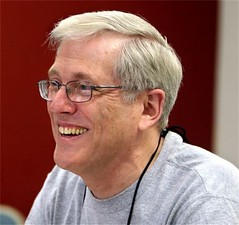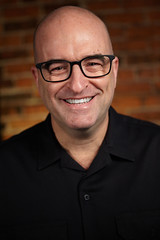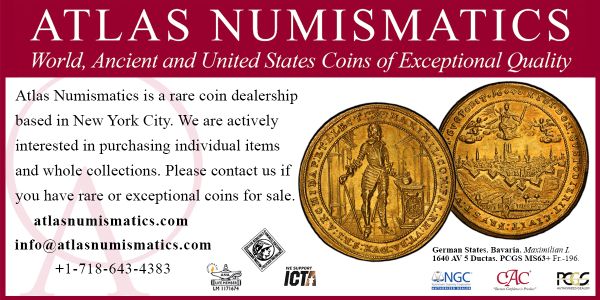
PREV ARTICLE
NEXT ARTICLE
FULL ISSUE
PREV FULL ISSUE
DAVID SCHENKMAN INTERVIEW, PART FIVEGreg Bennick's latest interview for the Newman Numismatic Portal is with token expert David Schenkman. Here's the fifth of six parts, where Dave and Greg discuss rarity and the mind of a collector. -Editor Greg Bennick: So in terms of rarity, not necessarily connecting rarity with which might be your favorite, do you have favorite pieces that you've collected over the years. Out of all the tokens that have passed through your hands, and of course, your time writing for Numismatic News and The Numismatist and all, or are there any specific tokens that have fallen under your collection that are your standout favorites. Ones that you can think of off the top of your head that were just the ones that you remember above all others.
Greg Bennick: I could totally see that. And at the same time I can imagine celebrating and being so excited about the acquisition or the find that you celebrate it for a while. But there's definitely in the collector mindset, and I've talked in other interviews about the collector mindset: what makes us collectors. What is it about our brains or about our approach to the world that makes us want to acquire or appreciate numismatic items, for example? And I'm fascinated and would love to write a book, I think on just that alone, the psychology of the collector. But there's something about us that once we acquire something, we're both satisfied and then we're on to the next thing, which is seemingly what you're saying about you write the book, you've completed that thing. Okay, now what's next? David Schenkman: Well, that's true. And you never get them all. This book that I've just finished, I finished the catalog. I'm close to having it published and on obsolete currency relating to coal mining. And just last month a note popped up that I didn't know existed from a coal and canal company in Pennsylvania from the 1830s as I remember. The note cost me a couple of hundred dollars. I don't even remember what, but I didn't even know it existed and there was something I added to the book after the fact. So I'm sure something else will pop up after the book is published. Greg Bennick: It's just incredible that the body of information is still unfolding even as we speak. That's inspiring because it means that not just the so-called experts can make finds and define the hobby, but that individuals might do that work as well, which is really inspiring for anybody out there aspiring to collect something new and different, like tokens and medals and or counterstamps, hard rubber tokens, and the other things we've talked about. David Schenkman: Well, that's true. And I think, of course, the internet has just opened it up because nobody lives in a vacuum anymore. So it's been a good thing and maybe a bad thing in some ways, but it certainly has brought out a lot of things that previously people didn't know existed. Greg Bennick: Well, and case in point, you know, with the Sprague and Blodgett counterstamp that I purchased, certainly I never would have been able to do the research as quickly and efficiently as I did the other night at one in the morning with Google finding all this information about this obscure piece that had arrived in the mail that day. So, it's just endlessly interesting, especially when we've got a focused point for our research. David Schenkman: I remember the first books I wrote I did on an IBM Selectric typewriter. Greg Bennick: Amazing. David Schenkman: Can you imagine how many pages I changed and re-changed? I had to find errors before word processing. Greg Bennick: I can't even imagine. Like you're looking over the page and you realize that you forgot a comma and therefore you have to retype the entire page. (laughter) One thing we didn't discuss at all and I just want to make sure that we touch on it, we talked about tokens and counterstamps and we talked about civil war tokens and all sorts of things, but we didn't talk about medals at all. And I've been kind of interested in medals recently because while I don't know much about them, when I'm walking around coin shows, wherever that happens to be, Baltimore, Long Beach, what have you, and I noticed medals these days, I'm looking at them now from a different mindset now that I've gotten interested in counterstamps and the history connected to specific counterstamps, for example. And what I like about medals is that sometimes medals are engraved with the names of the recipients, and you can learn about the recipients of those medals and make connections that way. What could you tell us about medals and the collecting of them that interests you? David Schenkman: Well, most people, I think, collect medals by topic as much as anything, and there's so many different kinds of medals. I don't collect medals generally, although I collect or did collect - I have them still - but I've got a full set of official British coronation medals from 1603 on to the 1935, which was the last one…37, I guess. I collected them and I still have them, but I don't collect them anymore because I have them all. But that's a topic.
I
have on my desk, and as you mentioned medals, I'm holding it in my hand, a medal that I just
found, and it's a two-and-a-half inch brass medal, and it's issued from Buenos Aires, Argentina,
in 1928 to commemorate a visit of Herbert Hoover, who visited there in December of 1928.
This is a very beautiful medal. It probably doesn't have a lot of value. I can't imagine that it's
worth $100. It's probably worth a lot less. I don't know how rare it is, but I was able to do some
quick research and it will probably be the topic of a column. I write a monthly column for The
Numismatist on tokens and medals. And so, I'm constantly looking for items to write about.
I look at an item like this and say, Greg Bennick: That's great. I'm actually quite similar. As I mentioned in a few of these interviews, I focus on error coins, but I've got a building set of Standing Liberty quarters and then a set of Indian heads and Flying Eagle cents, and I just love that aspect of all this too. So this is really been fantastic talking to you, just hearing the other side of the coin world, in essence. And that oftentimes what we hear about are date sets and then to hear from you about all these different areas of numismatics and like medals, for example, you know, issued as commemoratives for Herbert Hoover's visit. But then also like I mentioned, there's countless medals that were issued to specific people to celebrate an experience or an achievement. There's just so many ways to put your interest in coins in the hobby. It's just endless. David Schenkman: Yeah, it really is endless. I own a company that specializes in selling banjos of all things. (laughter) I know, don't laugh. Greg Bennick: I love it! I'm excited you brought it up because I went on your banjo site the other night and was amazed by it. So please feel free to let us know where to find that and tell us more. David Schenkman: Well, I wasn't going to give a pitch for banjos, but I collect numismatic items relating to banjos. I have a couple of engraved coins, and I've written columns about some of these. One lady banjo player, and it's on a half dollar as I remember, and I have other ones. I have even love tokens engraved with banjos. So, your collection can take so many twists and turns and you never know where the next turn is going to be, and that's part of the fascination.
To watch the complete video, see:
To read the complete transcript, see:
To read the earlier E-Sylum articles, see:
Wayne Homren, Editor The Numismatic Bibliomania Society is a non-profit organization promoting numismatic literature. See our web site at coinbooks.org. To submit items for publication in The E-Sylum, write to the Editor at this address: whomren@gmail.com To subscribe go to: https://my.binhost.com/lists/listinfo/esylum All Rights Reserved. NBS Home Page Contact the NBS webmaster 
|


